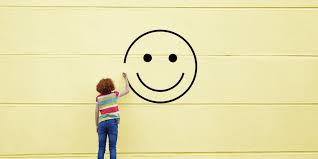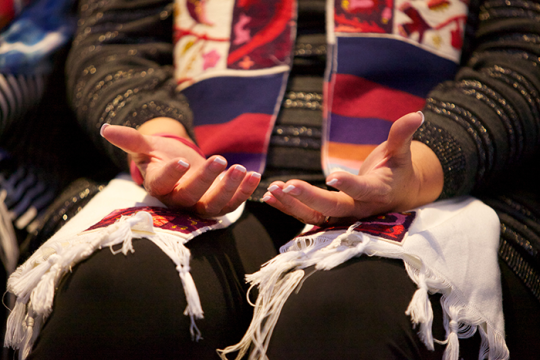
Alan Morinis is the founding director of The Mussar Institute, and the author of the books Climbing Jacob's Ladder and Everyday Holiness: The Jewish Spiritual Path of Mussar as well as an RJ magazine article about Musar, "Practice, Practice, Practice," and an accompanying Musar study guide. He was interviewed by then RJ editor Aron Hirt-Manheimer.
Is there truly a "Jewish perspective" on happiness?
Yes, Judaism teaches us that true happiness cannot be found in the material realm. So long as a person believes that happiness depends upon the acquisition of things or sensory experiences, they will spend most of their time in pursuit of only fleeting satisfactions, after which the focus quickly turns to the next meal, the next deal, the next car, or the next sexual encounter. In quantitative terms, a human being may be lucky to experience pleasure 5% of the time-having spent the remaining 95% of the time on the chase.
Instead, the Jewish answer to the question, "Who is rich?" is "The one who is happy with their portion" (Pirkei Avot 4:1).
A Wall Street Journal article points to happiness as emanating from life choices that confer long-term fulfillment, such as raising children or going to medical school.
I don't think that the distinction of long-run versus short-run endeavors is a determining factor in personal happiness. The Wall Street Journal writer might have been categorizing what could be considered "meaningful" pursuits-but even those, I believe, do not constitute the path to human fulfillment.
Judaism teaches us that in life there are three primary spiritual relationships: with one's own soul, with other people, and with God. Isolation from any of the three becomes a source of suffering. Thus, from a Jewish perspective, real happiness is to be found in relationships-and the deeper the better.
This, I believe, is why the Hebrew word simcha has two meanings: happiness and a celebration together with other people. If your simcha is a Jewish wedding, you lift a glass together, you dance in a circle in the presence of loved ones, and there's that sense of overcoming separation and merging into something larger than the self that touches the heart in profound ways.
This is also how the very pursuit of happiness can get in the way of experiencing happiness. If I believe my happiness comes from my getting what I want, I'm likely to become so focused on making sure I get whatever "it" is, I will increasingly think more about me and less about you. This diminishes the capacity I have to connect with you. And therein lies the potential for me to isolate myself more and more, with the result that I become increasingly unhappy.
In Judaism we recognize that being alone would deepen a mourner's risk of getting mired in depression. That is why we have the person recite kaddish, a prayer which is all about praising God in the presence of at least nine other people. We hope that the mourner's sense of separation can be transcended through human and Divine connection.
According to a Gallup study, people who are more religious tend to be happier.
Yes, and I think it's for this very reason. Much of the religious experience is about connecting with your own soul, with other human beings, and/or the transcendent-God.
Some people, though, may connect with only one of the three religious experiences-and that may be their way. You know the old joke: Fed up with an unruly congregant, the rabbi says, "I don't understand why you keep coming to shul, Cohen; you just talk the whole time." Cohen replies, "You know Goldstein?" The rabbi says, "Yes." "Well, Goldstein comes to talk to God. I come to talk to Goldstein."
I grew up as a child of Holocaust survivors in a highly charged emotional atmosphere. To protect myself I limited my range of emotions. Even now I don't go to the depths of sorrow or experience joy to the degree I believe I'm capable. The only times I achieved an outsized degree of joy were at the weddings of my three children. What can I do to change this condition?
I would caution you about thinking in terms of wanting more-as in more joy in your life. There is a real danger in using our imaginations to imagine the "ultimate" in happiness and then feeling dissatisfied with what we have because it never lives up to that level. It comes back to the Jewish lesson about "Who is rich? The one who is satisfied with his lot."
Jewish tradition teaches us to "walk in God's ways" (v'halachta b'drachav, Deuteronomy 28:9). It doesn't say we need to get to some ideal destination in our lives, but rather to step in a godly way. What matters is the journey in the direction of joy, rather than reaching the station; it is a trap to judge the distance traveled.
Why is it that at one of the greatest simchas-a wedding-our tradition has the groom break a glass to remind us of the destruction of the Temple in Jerusalem? Why must we connect great joy with great sorrow?
On a collective level, it's about our shared history and memory: We remember our people's tragedies even at the time of our greatest joy in recognition that both can exist simultaneously. On a personal level, it reminds us that the only way to truly experience joy is to have a sensitive heart, and a sensitive heart will also feel deep sorrow. A thermometer records both warmth and cold. A sensitive instrument records everything on the scale.
I think the breaking of the glass sends the message: It's okay to let yourself experience joy with an open heart, knowing that the openness is going to bring the full range of human emotion. Don't set yourself up by expecting only happiness. Life comes with a broken glass.
I realized this myself last year when I was preparing remarks to offer my daughter and her husband at their wedding reception. I started out by wanting to wish them much joy together. But as I thought more about it, I realized that would inevitably mean wishing them sorrow, too--that is, to be able to truly feel the pain of other people's troubles as well as their own. In the end, I simply wished Julia and Aaron an open heart (lev patuach), without which both joy and sorrow cannot happen.
I think our Jewish tradition wants us to have the sensitivity to cry with the mourner and dance at a wedding. We're not supposed to be sad, sad, sad, because then we would be closed to the goodness that exists at every moment, too. Nor are we to be happy, happy, happy, which would mean turning our backs on suffering. To be a whole person with a full range of feeling, one must cultivate the heart.
Related Posts

How the Pittsburgh Synagogue Shooting and Processing Grief Led Me to Heller High – and Changed My Life

Finding Emunah Amidst Fear and Uncertainty

